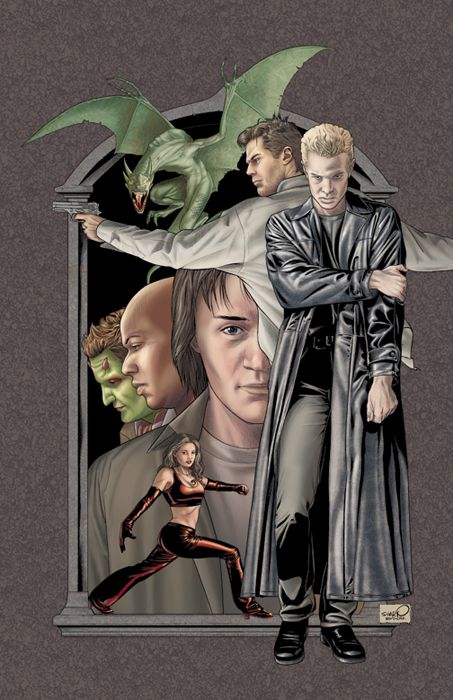With the first arc over, IDW’s take on what Season 6 of "Angel" might’ve been finally gives the people what they want -- a comprehensive explanation of what happened immediately after the final episode of Season 5. For those that remember, the finale of that series showed Angel and the surviving members of his crew -- Gunn, Illyria and Spike -- ready to fight an army of demons sent by Wolfram and Hart. Angel declared that he wanted to slay the dragon, and then . . . cut to credits.
Or, if you like, cut to “Angel: After the Fall” #5 -- the first part of a 3-issue mini-arc entitled “First Night.” Ongoing artist Franco Urru takes a break (despite what the cover thinks) while regular series writer, Brian Lynch, throws the spotlight on three cast-members to show how Los Angeles going to hell affected them.
The opening vignette shows Spike appearing mid-battle in Hell. Immediately, he realizes what’s going on, and takes this as his cue to, well, quit while he’s ahead. His decision is quickly reversed when, building on last issue’s cliffhanger revelation, he discovers a confused and vulnerable. . . Winifred Burkle. Lynch has Spike’s dialogue down perfectly -- after all, it was a Spike comic that got him this gig in the first place -- and as a result, of all the characters, he’s the one who springs off the page most.
The Spike/Fred subplot is a little less compelling, however. The two characters had a good relationship in Season 5 of "Angel" so it makes sense to continue that here, but then Season 5 also took pains to ensure that viewers understood Fred’s soul was destroyed and that she couldn’t be brought back, except superficially when Illyria imitated her. Is that what’s happening now, or is it something more? And if so, will the eventual explanation be satisfying enough to warrant it? I have my doubts; others might be more forgiving. If nothing else, I’m hooked enough that I want to wait around to find out what the answer is (before damning it as fan-fiction) so Lynch has proven himself in that regard.
The second piece shows Connor (Angel’s teenage son) dealing with finding himself in a street full of demons, and makes a fairly decent attempt at reconciling the fact that he’s got a false set of memories alongside original, just-as-confusing ones. It’s a great idea and Lynch has made it work fantastically. After the damage visited upon the character throughout Season 4 of "Angel," you can imagine he’d be hard to write, but this is easily the best story in the issue. Lynch’s take on Connor’s internal monologue feels both individual and realistic. If the entire series up to this point had entertained me as much as this story does, I’d have nothing but praise for it.
The final story spotlights Lorne, showing how, upon his arrival, he helped set up a safe area of hell and was chosen by the inhabitants to rule it. The tale is told in rhyming couplets in a manner that’s as excruciating as it is ambitious. Credit to Lynch for trying something different, but it’s just not fun to read. Artwork by industry veteran John Byrne is appropriately fairytale-esque, but the loose style ends up looking incredibly messy and rushed compared to his usual clean visuals. Some nice images make it through -- a demonic taxi cab, and Angel’s scroll that reads “Neat Plans” -- but it’s distinctly underwhelming on the whole.
Next issue will presumably go some way towards answering the series other big mysteries -- why Gunn’s a vampire, and why Angel isn’t -- and while those mysteries are compelling enough, it’s taken a while for the series to get to that stage. I’m cautiously optimistic, as the series has only been improving with each issue, but with the short-story format, this arc is prone to more variable in quality that could yet damage its chances of holding on to readers.

